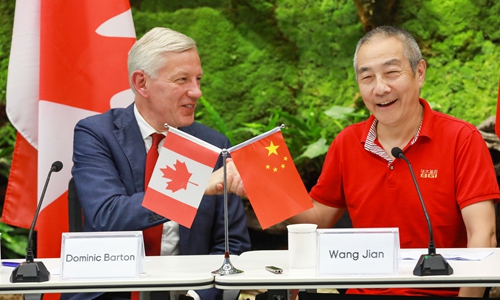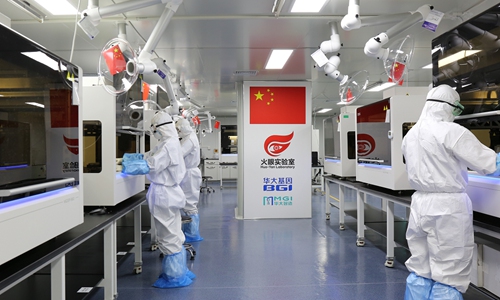Canada receives key COVID-19 testing equipment donation from China
By Deng Xiaoci Source:Global Times Published: 2020/5/14 13:46:06

Photo: BGI
Shenzhen, South China's Guangdong Province, has donated key laboratory equipment to Canada's Sinai Health, a major center for COVID-19 testing in the North American country. According to Chinese project contractor BGI Group, it will raise the Canadian facility's daily testing throughput to 2,000 samples and support the urgent need for additional testing capacity in Ontario.
The southern Chinese city's donation to Canada is being made via the Shenzhen-based Mammoth Foundation, and as a founding member of the foundation, the Chinese genomics BGI Group will be in charge of installation, training and logistics support, BGI told the Global Times on Thursday.
At the heart of this donation, among other equipment, is the MGISP-960 automated viral RNA extraction and sample preparation robot which will reduce manual processing times, while increasing testing efficiency and safety. The equipment is part of BGI's testing workflow approved for use by Health Canada under the Interim Order, according to BGI.
Since COVID-19 broke out, China and Canada have been supporting and assisting each other with robust anti-virus cooperation. The 32 tonnes of medical supplies donated by the Chinese government recently arrived in Canada, and China has also been facilitating Canada's commercial purchase of medical supplies in the country, Chinese Foreign Ministry spokesperson Zhao Lijian said at a routine press conference on Wednesday.
China is actively pursuing international cooperation in research and development of drugs and vaccines with several countries, including Canada. We stand ready to work with the Canadian side and the rest of the world to accelerate the development and production of COVID-19 medical products and contribute to global public health security and the joint response to the pandemic, Zhao noted.
Nucleic acid testing is considered essential for clinical diagnosis and for containing the spread of COVID-19.

Photo: BGI
"Sinai Health Foundation is grateful for the ongoing partnership and generosity of The Mammoth Foundation and BGI Group. This equipment will further enable Sinai Health to support testing in the Province of Ontario," Louis de Melo, CEO of Sinai Health Foundation, was quoted as saying in a press release the BGI sent to the Global Times on Thursday.
The donation also honors Canadian physician Norman Bethune, a household name in China, who led his medical team to China in 1938 to help Chinese people fight against Japanese invaders and sacrificed his life in November 1939.
Canadian Ambassador to China Dominic Barton attended the signing ceremony at the BGI headquarters in Shenzhen on Wednesday. "I would like to thank the Mammoth Foundation and the BGI Group for contributing to Canada's COVID-19 testing capability at this critical time through this generous donation of laboratory equipment to the Sinai Health System of Toronto," Ambassador Barton said.
Parliamentary Assistant Norman Miller of Ontario, whose constituency includes Bethune's hometown of Gravenhurst, thanked the Mammoth Foundation on behalf of Ontario Premier Doug Ford for supporting Ontario's efforts to fight the pandemic.
In fighting COVID-19, the Mammoth Foundation has been helping Chinese hospitals upgrade their testing laboratories, and making donations of testing kits to countries affected by the epidemic, as well as contributing key laboratory equipment to labs overseas.
On May 4, BGI announced that its Real-Time Fluorescent RT-PCR Kit for detecting COVID-19 received Health Canada approval for imports and commercial distribution in Canada under the Interim Order.
BGI's RT PCR testing kit for SARS-CoV-2, which has received emergency approvals from global regulatory agencies including the US FDA and most recently received Emergency Use Listing by World Health Organization (WHO), has been distributed to more than 80 countries, and more than 20 million tests have been shipped.
BGI also provides an emergency COVID-19 detection lab called Huo-Yan Laboratory, with P2 level biosafety protection and robots that can be quickly deployed around the world.
The first Huo-Yan lab was built in Wuhan in February in one week, providing testing capability of up to 20,000 samples per day. Such labs have since been built in the United Arab Emirates, Brunei, Serbia and Australia.
The name Huo-Yan, which means "Fire Eye," comes from Chinese mythology and signifies the ability to see disguised threats that lurk ahead - in this case to prevent missing undetected viral infections.
Posted in: SOCIETY,CHINA FOCUS